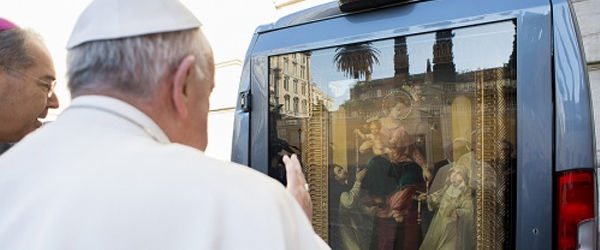On April 7, the 13th-annual Mass celebrating the legacy of Cesar Chavez was held in the Cathedral of Our Lady of the Angels. Some 3,000 people — many of them farm workers, labor union members and community leaders — joined the family of the founder and first executive director of the United Farm Workers at the 12:30 Sunday liturgy. Auxiliary Bishop Alexander Salazar, director of the Los Angeles Archdiocese’s Office of Life, Justice and Peace, which sponsored the Mass, was the principal celebrant. Farm workers from Oxnard, Delano, Bakersfield, Fresno and other far-flung locales came to honor the memory of the man who, with Dolores Huerta, started the UFW in 1963. Chavez himself became a migrant farm worker after graduating from eighth grade in the early ’40s, because his father, Librado, was disabled in an accident and he didn’t want his mother, Juana, to work in the fields. After serving two years in the U.S. Navy, he married Helen Fabela and settled in Delano. They would have eight children. The young man began reading about St. Francis and, especially, Mahatma Gandhi. The father of the Indian independence movement greatly influenced Chavez with his nonviolent civil disobedience tactics and prolonged fasts. Throughout his own leadership of the United Farm Workers, he would do water-only fasts lasting up to 36 days. Chavez said the fasts were, first of all, a way to purify his own body, mind and soul. But moreover, the lifelong Catholic observed, “the fast is also a heartfelt prayer for purification and strengthening for all those who work beside me in the farm worker movement. The fast is also an act of penance for those in positions of moral authority, and for all men and women activists who know what is right and just, who know that they could and should do more.”The father, grandfather and grassroots organizer, who would have turned 86 this past March, died peacefully in his sleep on April 23, 1993, at the age of 66. Cardinal Roger Mahony celebrated the funeral Mass, calling Chavez “a special prophet for the world’s farm workers.”The cathedral is also hosting a photo exhibit titled “Cesar Chavez: His Soul and His Spirit” by Victor Aleman, award-winning photographer and editor of the archdiocese’s Spanish-language newspaper Vida Nueva. He worked with United Farm Worker leaders from 1980 to 1990, co-founding Radio Campesina KUFW, the first farm worker radio station. He also was the managing editor of El Malcriado, the UFW’s membership publication, and director of the publication department for the union’s monthly publication Food and Justice.“I am dedicating this exhibit to Cesar Chavez, a man who saw and solved social and economic problems for farm workers and other poor people in the United States,” Aleman pointed out. “He defended the rights of immigrants, and taught and trained hundreds of thousands of people to overcome fear and act with courage.”The exhibit, which features 19 striking large-print photos, will run through April 28 in two side chapels. The cathedral is located at 555 W. Temple Street. {gallery width=100 height=100}gallery/2013/0415/chavezexhibit/{/gallery}

